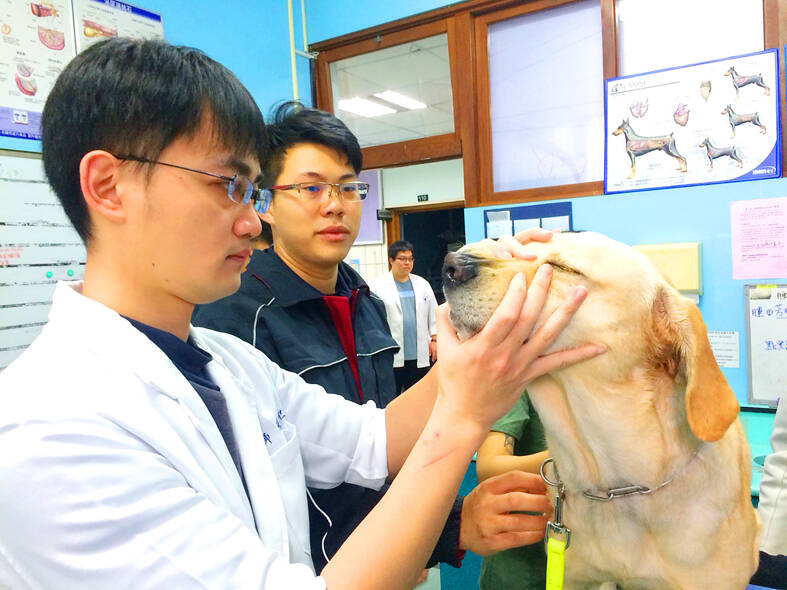The number of pet dogs and cats in Taiwan has officially outnumbered the number of human newborns last year, data from the Ministry of Agriculture’s pet registration information system showed.
As of last year, Taiwan had 94,544 registered pet dogs and 137,652 pet cats, the data showed. By contrast, 135,571 babies were born last year.
Demand for medical care for pet animals has also risen. As of Feb. 29, there were 5,773 veterinarians in Taiwan, 3,993 of whom were for pet animals, statistics from the Animal and Plant Health Inspection Agency showed.

Photo: Tsai Shu-yuan, Taipei Times
In 2022, the nation had 3,077 pediatricians. As of last year, 1,880 doctors joined the specialist physician program for children under three years old, who were in charge of caring for 195,552 children in 1,048 medical institutions.
The percentage of veterinarians that specialize in pet animals are higher in metropolitan areas or cities with tech professionals.
Hsinchu City, where the Hsinchu Science and Industrial Park is located, has the highest percentage of animal medical specialists.
The percentages in the six special municipalities are as follows: 84.3 percent in New Taipei City, 78.4 percent in Kaohsiung, 76.7 percent in Taoyuan, 76.4 percent in Taipei, 76.1 percent in Taichung and 70 percent in Tainan.
The nation has about 1,800 animal hospitals, but the number could potentially increase to 2,000 by the end of this year or next year, Taipei Veterinary Medical Association chairman Yang Hsiao-po (楊孝柏) said.
On average, each veterinarian cares for 575 animals, compared with 2,500 in Japan and 4,000 in the US, he said.
The rising demand for medical care for pet animals has also motivated more animal hospitals to increase investment in medical facilities, he added.
“In the past, veterinarians could open an animal hospital with just a table and a stethoscope. A large percentage of people treated their pets as nothing more than animals. If a dog or a cat vomited, you only needed to prescribe some medications, and if it did not work, pet owners just came back for more visits,” Yang said.
“People now treat dogs and cats as family members, and they could live as long as humans,” he said. “Animals now receive the same medical treatment as humans do. If they throw up, you have to do blood tests and an ultrasound to determine [whether] they have gastroenteritis.”
Not wanting to have children is only one of the reasons why more people choose to become pet owners, Yang said.
“Raising dogs and cats has healing effects, and people would choose to have pets to accompany their elderly parents so that their parents can have a normal and more social life,” he said.

An essay competition jointly organized by a local writing society and a publisher affiliated with the Chinese Communist Party (CCP) might have contravened the Act Governing Relations Between the People of the Taiwan Area and the Mainland Area (臺灣地區與大陸地區人民關係條例), the Mainland Affairs Council (MAC) said on Thursday. “In this case, the partner organization is clearly an agency under the CCP’s Fujian Provincial Committee,” MAC Deputy Minister and spokesperson Liang Wen-chieh (梁文傑) said at a news briefing in Taipei. “It also involves bringing Taiwanese students to China with all-expenses-paid arrangements to attend award ceremonies and camps,” Liang said. Those two “characteristics” are typically sufficient

A magnitude 5.9 earthquake that struck about 33km off the coast of Hualien City was the "main shock" in a series of quakes in the area, with aftershocks expected over the next three days, the Central Weather Administration (CWA) said yesterday. Prior to the magnitude 5.9 quake shaking most of Taiwan at 6:53pm yesterday, six other earthquakes stronger than a magnitude of 4, starting with a magnitude 5.5 quake at 6:09pm, occurred in the area. CWA Seismological Center Director Wu Chien-fu (吳健富) confirmed that the quakes were all part of the same series and that the magnitude 5.5 temblor was

The brilliant blue waters, thick foliage and bucolic atmosphere on this seemingly idyllic archipelago deep in the Pacific Ocean belie the key role it now plays in a titanic geopolitical struggle. Palau is again on the front line as China, and the US and its allies prepare their forces in an intensifying contest for control over the Asia-Pacific region. The democratic nation of just 17,000 people hosts US-controlled airstrips and soon-to-be-completed radar installations that the US military describes as “critical” to monitoring vast swathes of water and airspace. It is also a key piece of the second island chain, a string of

The Central Weather Administration has issued a heat alert for southeastern Taiwan, warning of temperatures as high as 36°C today, while alerting some coastal areas of strong winds later in the day. Kaohsiung’s Neimen District (內門) and Pingtung County’s Neipu Township (內埔) are under an orange heat alert, which warns of temperatures as high as 36°C for three consecutive days, the CWA said, citing southwest winds. The heat would also extend to Tainan’s Nansi (楠西) and Yujing (玉井) districts, as well as Pingtung’s Gaoshu (高樹), Yanpu (鹽埔) and Majia (瑪家) townships, it said, forecasting highs of up to 36°C in those areas